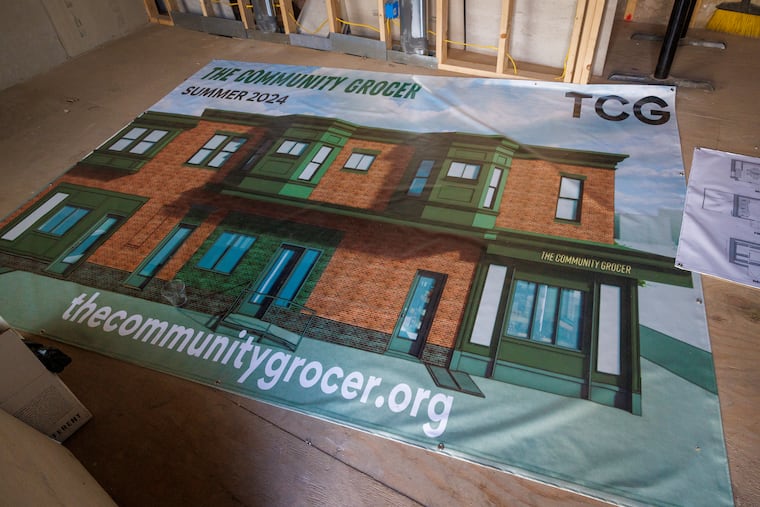Penn grads’ nonprofit grocery proposing hot food for SNAP recipients raises ‘hullabaloo’
The "ingenious" grocery, believed to be the first of its kind, has garnered attention from Boston to Portland., Ore.

The innovators of a plan to turn a Cobbs Creek corner store into a frontline outpost to battle hunger have been swamped this week with money, love, and questions.
Alex Imbot, 25, and Eli Moraru, 23, recent University of Pennsylvania graduates, are creating a first-of-its-kind system to legally circumvent federal rules that guide food stamps (now called SNAP, for the Supplemental Nutrition Assistance Program) to present healthy, hot food at their nonprofit, known as the Community Grocer (TCG). The store isn’t scheduled to open for months.
After an article about TCG appeared in The Inquirer on Monday, Imbot and Moraru said they’ve been overwhelmed with responses from interested individuals nationwide.
“Antihunger agencies from Boston, Texas, Chicago, New Mexico, and Portland, Ore., have reached out,” Imbot said. “The heads of large investment firms want to meet with us. The entire country is asking how they can re-create what we plan to do.
“Plus, people are sending us money, companies are offering to donate services and food, and national news organizations want to see what’s happening here. We’re being discussed throughout social media.
“It’s an overnight hullabaloo that’s been incredible.”
The reason behind the ‘hullabaloo’
The commotion centers on the creative way the store plans to contend with government bureaucracy.
U.S. Department of Agriculture rules stipulate that hot food can’t be purchased with SNAP benefits, which are conveyed through Electronic Benefit Transfer (EBT) cards. Rotisserie chicken and prepared deli foods are also off-limits.
At TCG, the usual grocery staples will be offered.
But the store will also sell the raw ingredients of portioned-out meals in kits, like chicken with potatoes and vegetables. After the customer buys the uncooked foods with their SNAP benefits, they will leave the grocery and walk to the rear of the building, into a separate shop that contains a kitchen.
The customer will hand over the meal kit to a worker, who will, in turn, give them a recently cooked version of the raw meal at no charge. The uncooked ingredients will then be made into another meal for another customer.
“I was intrigued by their concept,” said John Vena, owner of John Vena Inc., a 100-year-old produce importer and wholesaler at the Philadelphia Wholesale Produce Market in South Philadelphia. He called Imbot and Moraru after reading the article.
“I’d like to find a way to support the program, to learn their plans for sourcing fresh produce,” Vena said. “We’re trying to arrange a meeting.”
Similarly, a Philadelphia engineering consulting firm has said it’s willing to offer pro bono engineering design services for mechanical, electrical, plumbing, and fire protection systems. A local video studio suggested a similar arrangement to help with advertising or other needs.
Paula Jones, executive director of the hunger-fighting nonprofit, Zia Inc. in Fairmount, said she’s long considered building a network of corner stores with healthy foods based on meal kits. Her agency reached out to the TCG founders to talk about it. “You never know where the conversation can go,” she said.
The TCG model impressed George Matysik, executive director of Share Food Program, one of the largest distributors of food to pantries and other entities in the region. He compared Imbot and Moraru to Emma Smedley, a Philadelphian who helped pioneer the American school lunch program in the early 20th century, as well as to U.S. Rep. Dwight Evans (D., Philadelphia), for his work in getting fresh food to people living in areas lacking easy access to supermarkets.
“Eli and Alex are building on a legacy of Philly pushing the boundaries of what’s possible in our communities,” Matysik said. “They’re making a beautiful way to work around Washington’s bureaucracy. We’ve got their back in any way we can help.”
He added, it’s a “damn shame they have to do it at all.”
That sentiment has long been echoed by people who are committed to battling hunger but remain frustrated by the hot-food prohibition.
“I think the TCG idea is ingenious,” said Louise Hayes, a supervising attorney at Community Legal Services, and an expert on SNAP. “But we shouldn’t need clever work-arounds to do the job Congress needs to do.”
For roughly 50 years, the hot-food ban has been in place despite efforts to change it.
“It’s based on the racist, classist assumption that no one getting SNAP benefits should have the ‘luxury’ to eat hot food,” said Joel Berg, CEO of Hunger Free America, a national nonprofit based in New York.
The Hot Foods Act, a bipartisan effort in Congress with sponsors that include U.S. Rep. Brian Fitzpatrick (R., Bucks, Montgomery Counties), would permanently end the prohibition. It’s not clear whether enough support exists to implement the initiative.
In the meantime, the TCG founders will continue efforts to push their idea, gratified to have heard from so many who believe in them.
“It’s been an incredible outpouring of support,” Imbot said. “We’ve had quite a week.”